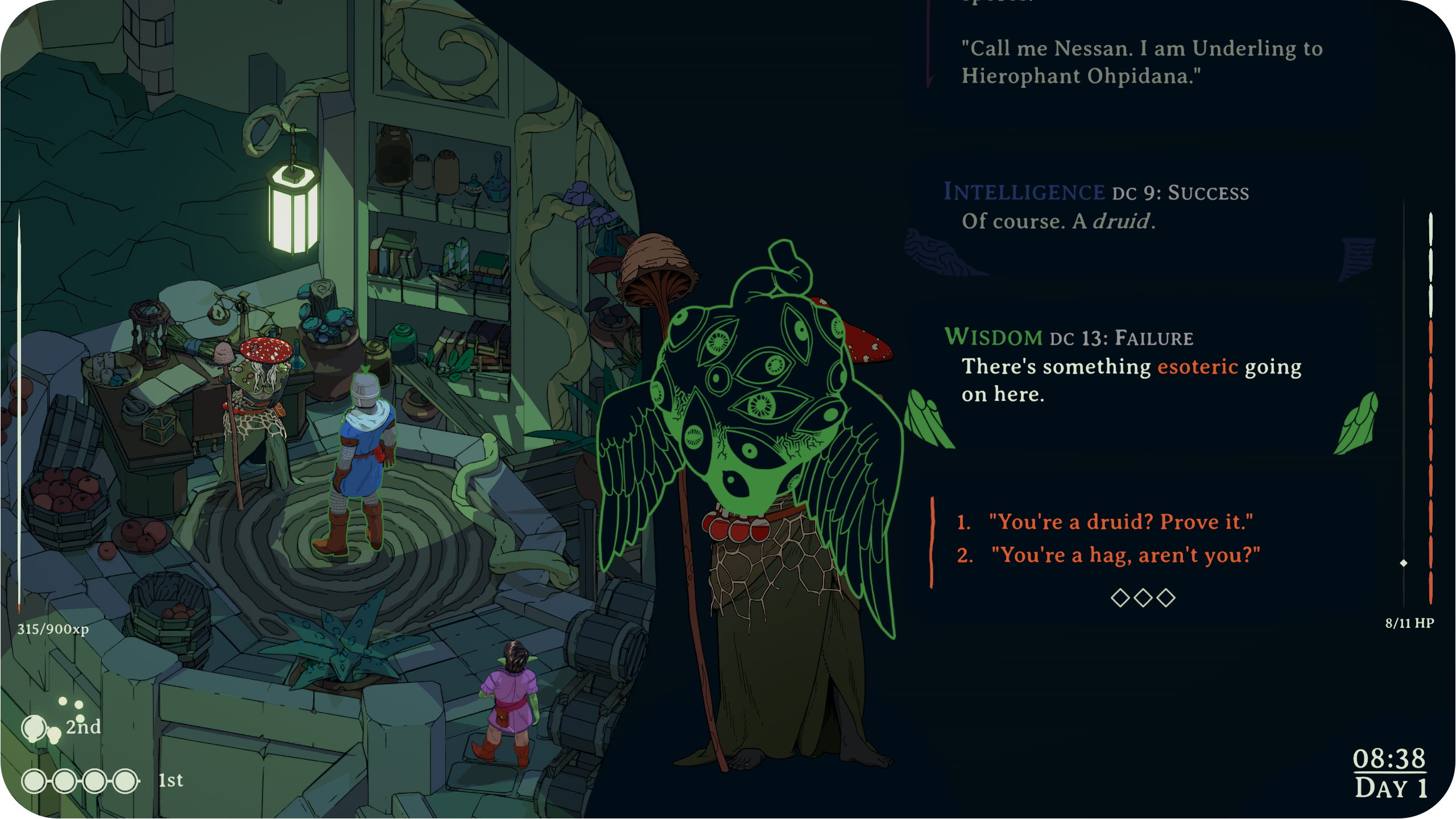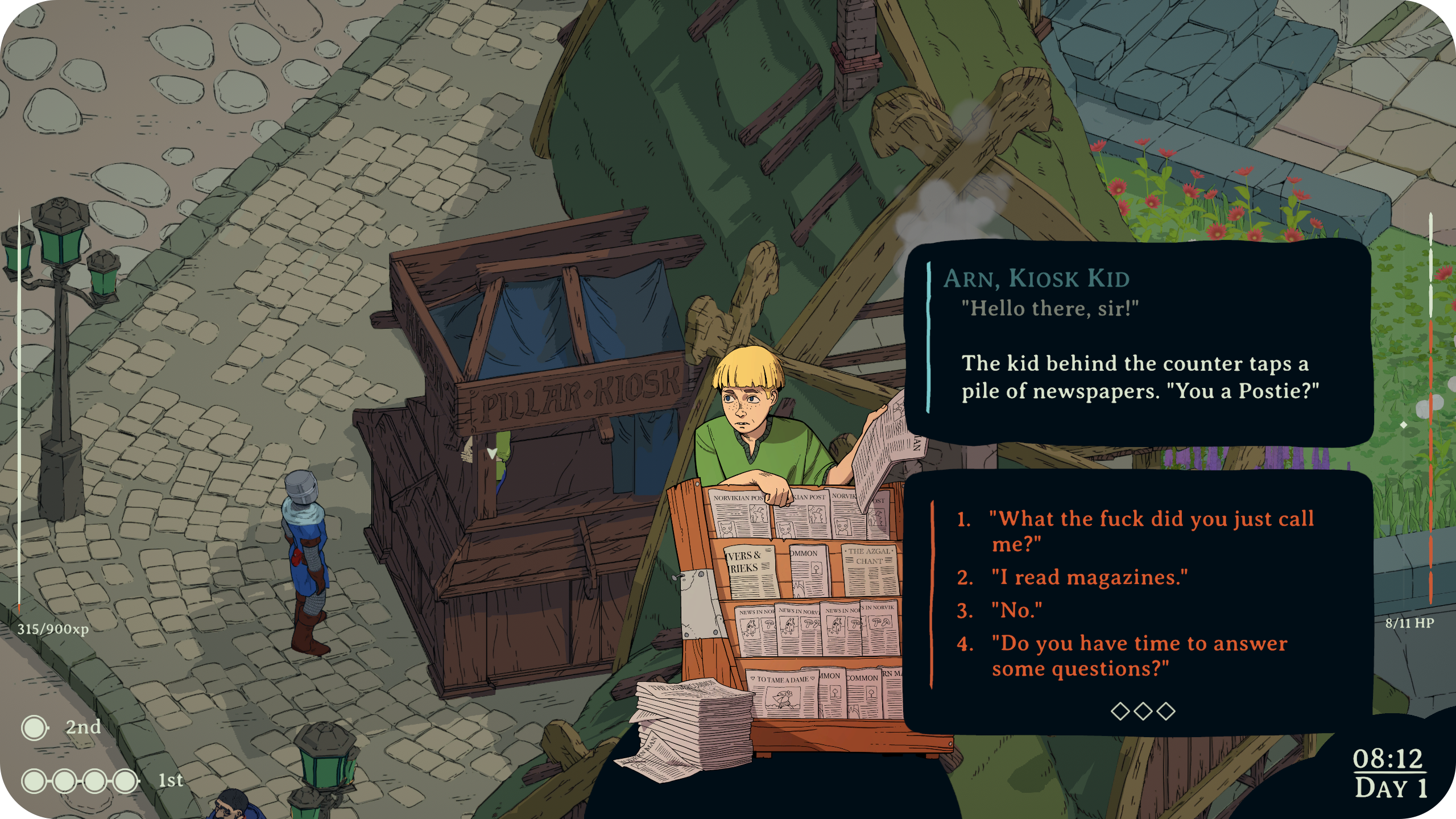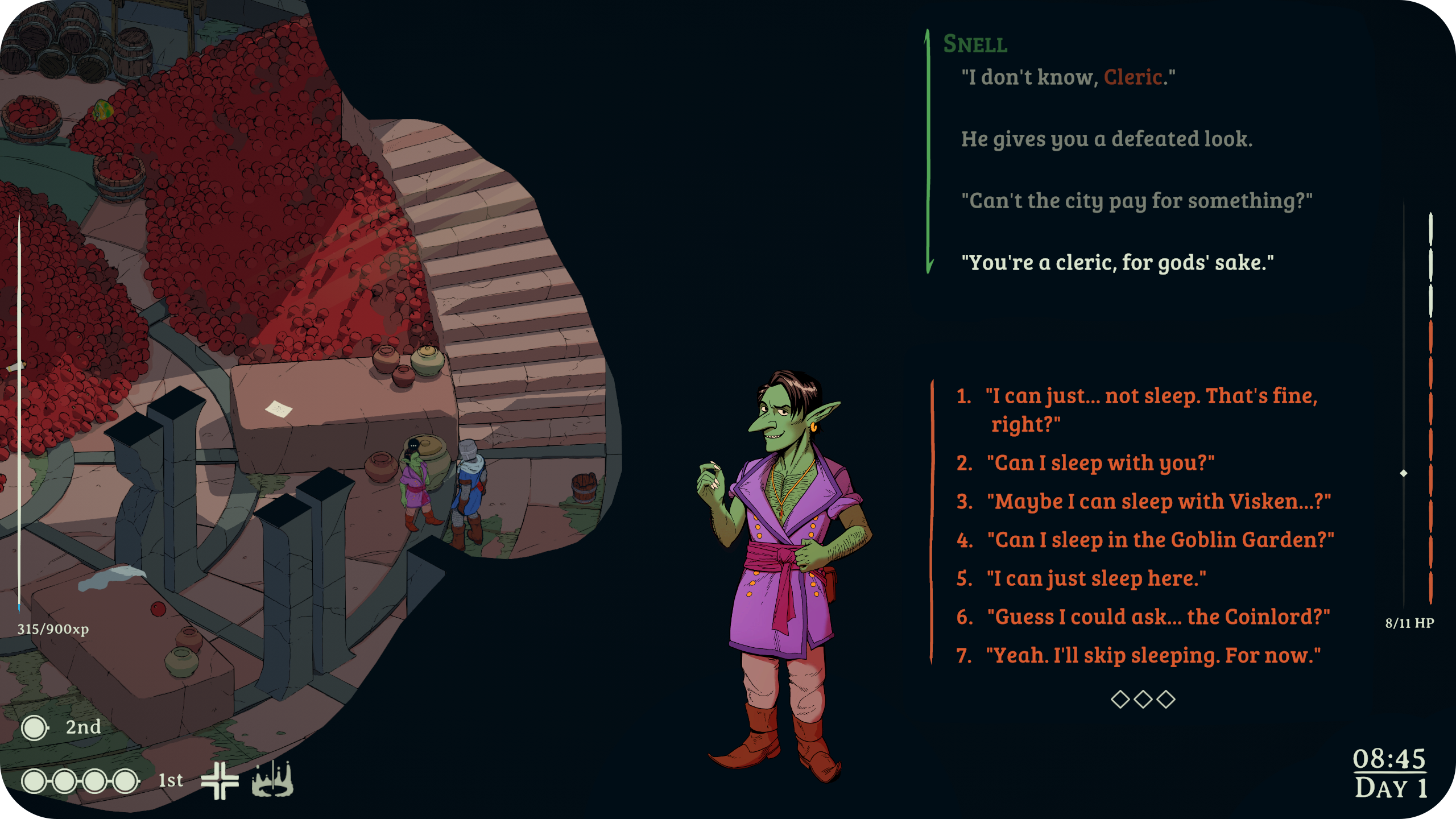An Esoteric Campaign - Writing
Ebb has a lot of text in it.
Making a game like this constitutes an insane amount of
writing. Of course, as anyone who's attempted to create an interactive story knows, adding choices, routes, or dynamic content means adding layers of complexity that exponentially increases work. You have to keep potential narrative states in mind as you write each scene. You have to understand and balance whatever systems mesh with the story. You have to convince the player that their 'choices matter'. All of this is difficult, tedious, annoying, and
absolutely, completely worth it.
I love writing interactive stories. It's a constant blend (or struggle) of writing and design, especially in a game like Esoteric Ebb. The main reason why I even started working on Ebb back in the day was so I could actually do this weird, niche style of
writing-design for a living. And more importantly, so I could actually improve as a writer and designer. When it comes to how I write on Ebb, I've got a sort-of philosophy - three sort-of rules, that help guide the general style.
AGENCY AS A PRIORITY
My definition of Agency is this:
it's the feeling you get when you receive feedback on your choices. If there is no feedback, or if the feedback goes unnoticed, then there is no Agency. Additionally, you receive Negative Agency when that feedback is not what you expected - and Positive Agency if it is.
My goal in Ebb is to always maximize Agency by this definition. In the basic dialog design, that means having choices lead to outcomes clearly indicated in those choices, as well as always focusing on using exposition to put images and ideas in the player's head that explore those potential outcomes. In the long-term this also means having character creation/progression that leads to unique content clearly shown to the player as being available due to the choices made in those systems. That's a very wordy way to put it, but in general, this is nothing more than the DM leaning in an double checking to make sure you (and your character) is aware of how dangerous it is to mess with a demon lord at level 1. Or hinting clearly that the town guard might (or might not) be the kind to take bribes. Or even, in a session 0, explaining to the player that playing a Warlock involves potentially dealing with a chosen patron. This might seem obvious. But using this as a mantra when writing dialogs makes them so, so much better, at least for me!

The Chimes make sure the player is always on the same page as The Cleric.
The argument against this kind of thinking is, on the other hand, the element of surprise. If the DM (or game designer) were to exposition each and every potential outcome in extreme detail, then that could kill the thrill of not knowing. Twists in the narrative wouldn't be possible. Etcetera. But I tend to disagree with that kind of thinking when it comes to interactivity - at least as a general rule. Breaking the rules is great, and can create incredible moments of shock and/or player disempowerment. But overall I find that giving the player expected feedback to their input as often as possible is just such a better way to
consistently establish a feeling of actually being in control of the narrative. As long as the exposition itself isn't boring.
KEEP THE PLAYER ENGAGED
I have the attention span of a goldfish. And I'm betting some of you do too. This tends to be a problem when I'm trying to engage with a story that's primarily blocks of text. I always say that my biggest challenge in making Ebb is not having 'good writing', but rather just avoiding having the player skim. Skimming is death. Pure death. Especially in an interactive story where the player has to be constantly engaged in order to make informed choices (and thus tap into that previously mentioned juicy
Agency). One of the ways I tackle this issue, is simply to chop up the story into pieces. This is common in a bunch of different video games, but the simple act of having the writing be delivered line by line, with a CONTINUE button in-between does add a lot to keeping the player's attention. Of course, this is nowhere enough, since I'm sure many of you have spam-clicked your ways through uninteresting game-stories at some point.
It's not about how many choices you get, but how often interesting choices appear.
So my second basic guideline to keep engagement, is just to have a fairly high Choice-to-Text ratio. If the game constantly confronts the player in a way that allows them to take a stand and/or actually express themselves in the world- i.e. if it's actually fun to read the text and actively interpret it to figure out which choice is the one you actually want to choose - then that's... fun. Engaging. It'll keep the player awake, hopefully. At least it works for me.
EVERYTHING IS REAL
This might seem a bit strange. Early on when working on EBBRPG, as the project was originally called, I decided on a pitch for the world and setting. The pitch was: what if you take the 5E ruleset, and treat it with complete realism? How would an economy function if third level spell slots were commonly available? How would laws be created with charming magics in mind?
My previous post went on a bunch about this topic. But this isn't just contained to fantasy tropes. When writing Ebb (and really, when I run TTRPGs in general) I tend to run things with my personal flavor of absurd realism. The characters are real. I don't hang lanterns. The factions, and economies, and supply lines, and interpersonal conflicts are supposed to be as realistic as they possibly could be. The world is consistent and everything can be explained.
In that realism, that's where I find the funniest shit. At least, the type of shit
I find funny.
The Cleric is ridiculous. But he's way too real, believe me.
Ebb is a wacky adventure of The Cleric and his goblin sidekick. The Esoteric Coast is supposed to be a
weird setting. But to me it's all real. And that's what keeps the story grounded, despite everything fantastical and esoterical going on. The characters are real people with wants and needs and messy complex thoughts. And applying that concept of a 'character' onto every demi-lich, plant, brick wall, and crab you come across - that's what makes Ebb so much fun to write. And design.
Design-write.
-Christoffer Bodegård
































